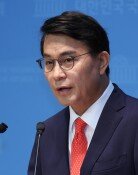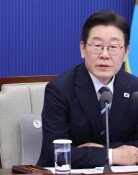Reform session shows president¡¯s shift
Reform session shows president¡¯s shift
Posted October. 05, 2000 12:25,
The reason that President Kim Dae-Jung convened an emergency session on structural reforms in four major sectors was to demonstrate his firm resolution to overcome the potential economic crisis. Following receiving briefings on the 12 key tasks from Finance-Economy Minister Jin Nyum and six other economic-related ministers, Kim and the ministers, taking a luncheon together, exchanged candid views on the nation's economic plight.
First of all, the president showed a change in his assessment on the current economic conditions.
"There are external factors such as oil price increases, semiconductor price declines and a bearish U.S. stock market," Kim said. "But there is no denying that internally there are underlying causes such as fatigue, leading to the inability to thoroughly implement four-sector reforms, which in turn leads to degrading market credibility."
Kim's latest remarks are interpreted as reflecting a change in his recognition of the critical economic situation.
As evidence to show the nation¡¯s loss of credibility, the chief executive pointed out that stock prices have been dipping, despite the fact that foreign investors viewed Korean stock as underestimated by 30 percent. Kim's statement has a considerable disparity with the economic ministers' who repudiated the economic crisis assertions, based on the favorable macroeconomic index.
The president¡¯s acknowledgment of an economic crisis also is perceived as his intention to personally check the progress in the implementation of the 12-point reform programs.
However, he made it clear that defeatism should be discouraged. Kim stressed that the contents of the briefing on the reform tasks need to be widely propagated to the people and foreign investors, so that they understand the government's firm resolution and the potentiality with regard to reforms. During the luncheon, the participants also exchanged views on the public enterprises' corporate restructuring, their privatization, labor issues and banking loan scandals.
The fact that President Kim directed the ministers concerned to take responsibility for the failures in sales deals for Daewoo Motor and Hanbo Steel could also reflect his determination to gear up his reform drive.
Kim, referring to labor-management relations, asserted that the enterprises should win in the competitions and that if they win, they will be able to fairly distribute the incomes to the employees, too, but that if the profits are not increased, the workers are not entitled to ask for increased wages.
Choi Young-Mook ymook@donga.com







